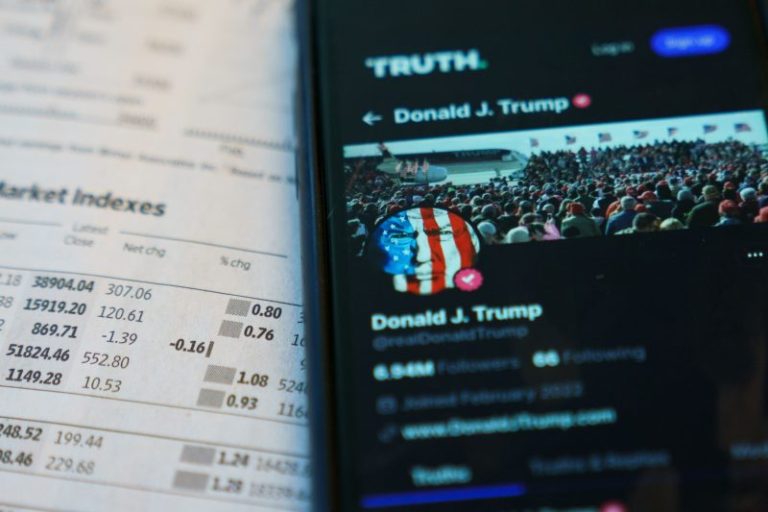Distilled, the value proposition of buying public shares of the parent company of Truth Social is: Donald Trump will make you money. This is not an unusual value proposition for a stock, certainly; they are all predicated on someone making you money. In this case, though, the proposition is unusually centered in the moneymaking skills of one person, more so than perhaps any stock besides Tesla.
This has been the value proposition of nearly everything Trump has ever done. Even his presidential campaigns are rooted to no small extent in the idea that Trump will make you richer; his 2024 campaign is certainly investing a lot of energy in the idea that he did or will present Americans with a financial windfall.
The problem, of course, is that the most reliable beneficiary of Trump’s theories of enrichment is Donald Trump. In the case of Truth Social, even he isn’t doing terribly well at the moment.
It’s interesting to consider what Truth Social is presenting to potential investors without the Trump element. It’s a social network, like X back when it was Twitter. There’s nothing technically exceptional about it; in fact, it’s simply a slightly modified instance of an out-of-the-box social-media-site tool kit called Mastodon.
The only thing that makes it different from anything else is that Donald Trump owns it and posts on it and has pointed his huge base of support at it as a venue. And that was enough for a lot of people to jump in when the stock went public, including some people who bet their futures on it.
What’s happened since the stock went public at the end of last month is not normal. Consider three other tech stocks, ones that put a bit more effort into the “tech” part.
When Google and Twitter went public in 2004 and 2013, respectively, prices quickly jumped upward from their initial offer prices and then held fairly stable. Facebook’s stock, made public in 2012, stayed flat at the outset and then dropped over the next few weeks.
Now let’s superimpose shares of Trump Media & Technology Group (ticker: DJT). It rose from the offer price, pushing Trump into Bloomberg’s list of the 500 richest billionaires in the world. And then it started steadily shedding value.
It was like its own little tech-stock bubble went pop. Trump’s share of the stock was worth north of $5 billion at the end of March. On Monday, Forbes put it closer to $2.2 billion.
If we look at each of the stocks relative to its initial offer price, you can see how much sharper the drop in Trump’s stock was than Facebook’s.
Trump has been breathlessly insisting to his social media followers — people who definitionally already use Truth Social — that the company was intertwined with his broader effort to overhaul the country.
“If people who believe in putting America First and want to Make America Great Again, support TRUTH,” he wrote over the weekend, obviously referring to the company and not the concept of honesty.
This is part of the problem. Trump is overextended. His brand is “fighter for the common man,” but he also needs money. So his brand extends to “buy this all-American Bible” and “buy digital pictures of Trump” and “buy shares in the parent company of this Mastodon instance.” If making America great again somehow requires buying Trump-branded sneakers, it’s possible he has lost the plot.
Trump allies will point out that the comparison drawn above perhaps implies that better days are ahead. After all, Facebook and Google and … well, Facebook and Google are doing well. Which is true. Each also had huge user bases when they went public and big teams doing innovative work. Each was predicated on the idea that they could innovate to higher profits.
Perhaps DJT will prove to be a huge success, rewarding early investors for their foresight. Or maybe it will be Trump Taj Mahal II. Feel free to make your own bet on the question.

